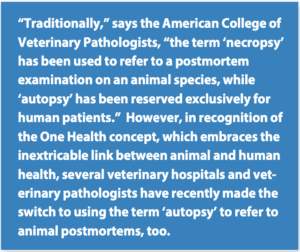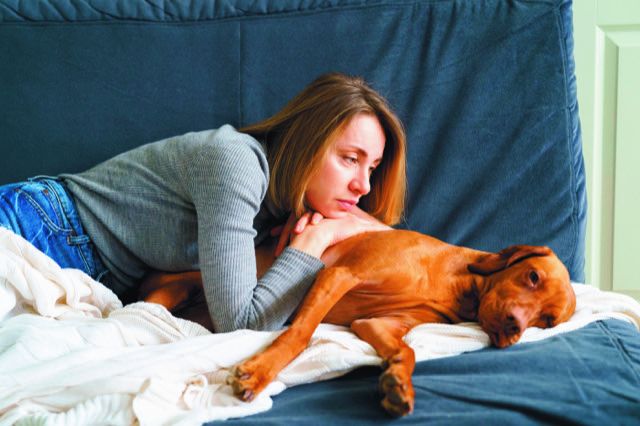Most often, people with dogs have to make a decision about euthanasia when a disease overtakes the animal’s health to the point that his life is no longer worth living. It’s probably the hardest decision anyone who loves a dog ever has to make. But sometimes, a dog dies unexpectedly. He hasn’t appeared sick and may not even be old, but one day a human family member comes home and finds him gone. Or a dog dies while in the hospital but not because of the condition for which he has been admitted. Or he has been admitted with a number of ailments, but it’s not clear which one took his life. It’s a misery — and a shock — of a different kind.
Numbers on how often that happens haven’t been compiled. But in one study of necropsies (animal autopsies) performed at Perdue University’s Small Animal Diagnostic Laboratory over a 5-year period, nearly 10 percent of the procedures had been on dogs who died unexpectedly and had not had any history of life-threatening disease.
The main reasons for sudden canine death
Why might a dog die seemingly out of the blue? People sometimes assume their pet was poisoned intentionally, but a study entitled “Causes of sudden unexpected death in dogs and cats—it’s not the neighbour!” shows that’s not the case. Looking at the reasons for sudden, unexplained death in 150 dogs for the Ontario Animal Health Network during the period spanning from September 2015 through September 2019, veterinary pathologist Dr. Margaret Stalker of the University of Guelph Ontario Veterinary College found the top causes to be as follows:
- hidden cancer (often hemangiosarcoma of the spleen — a large tumor of the spleen’s blood vessels that may suddenly rupture, causing massive bleeding into the abdomen)
- heart problems
- respiratory issues (with more than half the cases resulting from aspirated food
- trauma (being hit by a car or attacked by a predator such as a coyote).
Often, the findings are not diagnoses of specific illnesses but just locations in the body  where something went wrong.
where something went wrong.
When to consider requesting a necropsy
If your own dog dies suddenly, is it important to ask for a necropsy to find out why? It’s a very individual decision. But the American College of Veterinary Pathologists, whose members specialize in performing necropsies, says that “in some cases, necropsy findings can give comfort or closure to an owner.” This is especially the case, they say, when there’s a sudden, unexplained death. Some owners may want to learn that there’s nothing they could have missed in caring for their pet — no signs they failed to heed.
The group also points out that “necropsy contributes to the body of scientific knowledge by increasing our understanding of anatomy and physiology in health and disease.”
John Berg, DVM, the editor-in-chief of Tufts Your Dog, agrees. “In both human and veterinary medicine,” he says, “autopsies and necropsies are not done often enough. Doctors can learn from them how to better identify life-threatening diseases before they actually take a life.”
That said, not many veterinary offices have people on staff who perform necropsies. It might be much more difficult to find a qualified pathologist at a vet’s office in a sparsely populated region than in a major city.
If you are ever interested in having one done on a dog who has passed, veterinary schools are a very good place to start looking as they often perform them. Your pet’s doctor might also be able to provide leads for finding one in your area.
In some cases, an autopsy might cost as little as $100. In a complicated situation where it might be more difficult to nail down the exact cause of death, the price could increase to several hundred dollars, and in relatively rare cases, more than that.





